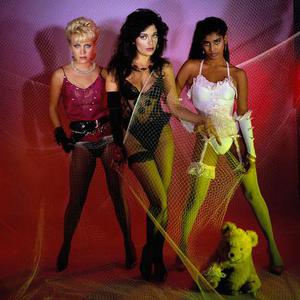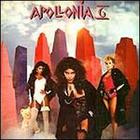Apollonia 6

- Meta style:
- Dance
- Style:
- Dance-Pop
Apollonia 6 was a 1980s female singing trio created by Prince as a continuation of a previous group, Vanity 6. After a number of disputes with Prince, Denise Matthews, also known as Vanity, the lead singer of Prince-created Vanity 6, fled the Prince entourage in 1983 to pursue solo endeavors recording with Motown Records and acting in films. She left open an acting position for the role written for her by Prince in the film Purple Rain.
After a number of disputes with Prince, Denise Matthews, also known as Vanity, the lead singer of Prince-created Vanity 6, fled the Prince entourage in 1983 to pursue solo endeavors recording with Motown Records and acting in films. She left open an acting position for the role written for her by Prince in the film Purple Rain.
After a frantic casting call, the film's director met actress and model Patricia Kotero. Renamed by Prince as "Apollonia", Kotero stepped into Vanity's role in the film Purple Rain, as well as in the fragmented group, Vanity 6. The other two members of Vanity 6, Brenda Bennett and Susan Moonsie, joined Apollonia and reformed the group as Apollonia 6 for the film and one album. During this time it was rumored that Apollonia and Prince were romantically involved with one another, but it was later revealed that Apollonia was actually married. Her "relationship" with Prince had been more of a PR stunt for the film than anything serious.
Apollonia 6 only had one hit with "Sex Shooter" in 1984. Prince had originally intended his classic tracks "Manic Monday" (later recorded by The Bangles), "17 Days" (later used as the B-side to "When Doves Cry"), and "The Glamorous Life" (recorded by Sheila E. in 1984) for the Apollonia 6 album but he soon lost interest in the project when he became convinced that Apollonia was only there to fulfill her job's obligations and would not be continuing with his group after her contractual obligations to completing the film and one album were fulfilled. Apollonia 6 were slated to open the Purple Rain tour with Prince and Sheila E., but that idea was scrapped after the group returned from a promotional tour of Europe.
After the group's demise, Kotero continued working on TV shows such as Falcon Crest and in B-movies for the next decade. She even released a solo album to lackluster success in 1988. The main criticism of the album was that Kotero tried too hard to give the impression of change; she adopted a more pop/California sound in place of her signature R&B/funk sound that had been successfully established for her formerly by Prince.
Source: Wikipedia, the free encyclopedia
- Sort by

Apollonia 6
- Year:
- 1984
- Tracks:
- 7
- Bitrate:
- 320 kbps
 Vanity 6
Vanity 6